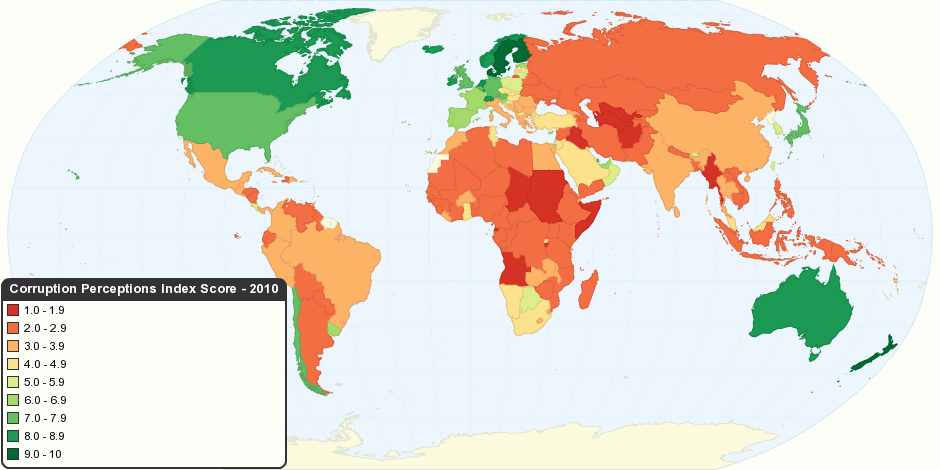This chart shows Corruption Perceptions Index (CPI) around the world. The CPI index score on a scale from 10 (very clean) to 0 (highly corrupt).
2010 CPI key findings:
- Denmark, New Zealand and Singapore tie for first place with scores of 9.3.
- The CPI shows that nearly three quarters of the countries in the index score below five. These results indicate a serious corruption problem.
- Unstable governments, often with a legacy of conflict, continue to dominate the bottom rungs of the CPI.
- Afghanistan and Myanmar share second to last place with a score of 1.4, with Somalia coming in last with a score of 1.1.
What is the Corruption Perceptions Index?
The Corruption Perceptions Index (CPI) measures the perceived level of public-sector corruption in 180 countries and territories around the world. The CPI is an aggregate indicator that combines different sources of information about corruption, making it possible to compare countries.
How the Corruption Perceptions Index calculated?
The Corruption Perceptions Index (CPI) is a "survey of surveys", based on 13 different expert and business surveys carried out by independent and reputable institutions. It captures information about the administrative and political aspects of corruption. Broadly speaking, the surveys and assessments used to compile the index include questions relating to bribery of public officials, kickbacks in public procurement, embezzlement of public funds, and questions that probe the strength and effectiveness of public sector anti-corruption efforts.
All sources measure the overall extent of corruption (frequency and/or size of bribes) in the public and political sectors, and all sources provide a ranking of countries, i.e. include an assessment of multiple countries.
For a more detailed explanation of the CPI method please follow the reference link below
"Everyone has a role to play, not only Governments, but also parliamentarians, businesses, civil society, the media and the average citizen. Corruption hurts us all, therefore fighting it is a shared responsibility"
- Antonio Maria Costa, UNODC Executive Director
15 years ago

